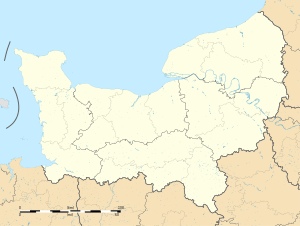Orival, Seine-Maritime
| Orival | ||
|---|---|---|
| Commune | ||
|
The church in Orival | ||
| ||
 Orival Location within Normandy region  Orival | ||
| Coordinates: 49°18′46″N 0°59′51″E / 49.3128°N 0.9975°ECoordinates: 49°18′46″N 0°59′51″E / 49.3128°N 0.9975°E | ||
| Country | France | |
| Region | Normandy | |
| Department | Seine-Maritime | |
| Arrondissement | Rouen | |
| Canton | Elbeuf | |
| Intercommunality | Métropole Rouen Normandie | |
| Government | ||
| • Mayor (2001 - 2008) | Jean-Louis Tailleux | |
| Area1 | 9.55 km2 (3.69 sq mi) | |
| Population (2006)2 | 990 | |
| • Density | 100/km2 (270/sq mi) | |
| Time zone | UTC+1 (CET) | |
| • Summer (DST) | UTC+2 (CEST) | |
| INSEE/Postal code | 76486 /76500 | |
| Elevation |
2–131 m (6.6–429.8 ft) (avg. 17 m or 56 ft) | |
|
1 French Land Register data, which excludes lakes, ponds, glaciers > 1 km2 (0.386 sq mi or 247 acres) and river estuaries. 2 Population without double counting: residents of multiple communes (e.g., students and military personnel) only counted once. | ||
Orival is a commune in the Seine-Maritime departement in the Normandy region in northern France.
Geography
A village surrounded by woodland and situated by the banks and cliffs of the river Seine, just 12 miles (19 km) south of Rouen at the junction of the D938, D64 and the D132 roads.
History
The history of the town goes back to Neolithic times, as proved by the finds of stone-age tools and mammoth bones in the numerous large caves and the cliffs of the area.
The Romans also left traces of their passing, with the remains of a fanum visible on one of the hills.
King Richard I of England (the Lion Heart) was very active in the region, erecting a castle here in 1195. His brother John of England (known as John Lackland), could not hold on to the territory and the building was already a ruin by 1203.
Heraldry
 |
The arms of Orival are blazoned : Azure, a base azure, on which a mount from which issuant a tower argent and 2 trees proper, and on a chief gules a leopard Or. |
Population
| 1962 | 1968 | 1975 | 1982 | 1990 | 1999 | 2006 |
|---|---|---|---|---|---|---|
| 1100 | 1164 | 1132 | 926 | 1004 | 1071 | 990 |
| Starting in 1962: Population without duplicates | ||||||
Places of interest
- The church of St.Georges, dating from the fifteenth century.
- The ruins of the thirteenth century castle of Roche-Fouet.
See also
References
External links
| Wikimedia Commons has media related to Orival (Seine-Maritime). |
- Official Website of Orival (in French)
- Orival on the Quid website (in French)